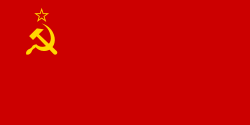 | ||||||||||||||||||||||
| FIBA zone | FIBA Europe | |||||||||||||||||||||
|---|---|---|---|---|---|---|---|---|---|---|---|---|---|---|---|---|---|---|---|---|---|---|
| National federation | Soviet Basketball Federation | |||||||||||||||||||||
| Under-19 World Championship | ||||||||||||||||||||||
| Appearances | 4 | |||||||||||||||||||||
| Medals | ||||||||||||||||||||||
| Under-18 European Championship | ||||||||||||||||||||||
| Appearances | 15 | |||||||||||||||||||||
| Medals | (1992 as CIS) | |||||||||||||||||||||
| ||||||||||||||||||||||
Medal record
| ||||||||||||||||||||||
The Soviet Union men's national under-18 and under-19 basketball team was a men's junior national basketball team of the Soviet Union. It represented the country in international under-18 and under-19 (under age 18 and under age 19) basketball competitions, [1] until the dissolution of the Soviet Union in 1991. In 1992, CIS men's national under-18 basketball team represented the Commonwealth of Independent States in international under-18 competitions. [2] After 1992, the successor countries all set up their own national teams.